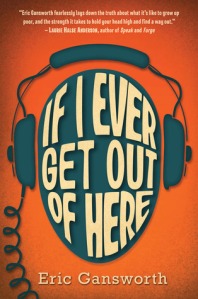To know what it’s like to walk a mile in someone else’s shoes, read Eric Gansworth’s YA debut, If I Ever Get Out of Here
Few novels have affected me the way Eric Gansworth’s book, If I Ever Get Out of Here did. Gansworth’s insider knowledge of the way a bullied outsider feels makes reading this novel feel like witnessing a horrible crime without any way of stopping it. Set in the 1970s, Ganswrorth’s protagonist, Lewis, a Native American boy, who is learning to negotiate the disparities between life outside the rez and his pride about who he is and how much his culture means to him.
From the moment he befriends George, the army brat whose life is regulated by his own unusual circumstances (Military personnel and their families of the era suffered their own form of ostracism), Lewis’s life moves from loneliness to friendship to frustration. Few writers could pull of such a complex intermingling of an outsider’s POV and the subtle complexity of white privilege and bigotry. In addition, Gansworth seemingly intimate knowledge of what it means to be a kid, powerless in a world ruled by clueless adults, made Lewis’s frustration and rage palpable to the point of making me want to beat up the bully myself. As the adults around him give Lewis conflicting advice, the young people in the story take matters into their own hands and the results are hardly unexpected. When confronting a bully, they prove that only the language of a bully gets through to a bully. But Gansworth’s most insightful comments took my breath away, when Lewis, the abused outsider whose only crime is being a “smart Indian” explains: we are all supporting characters in someone else’s story.
For 7th grade and up
Questionable Behavior = ?
Violence = VV
